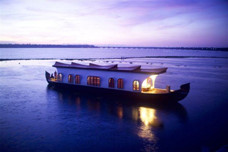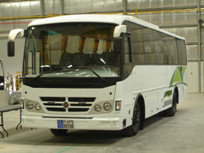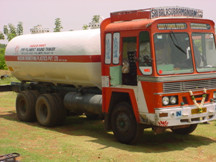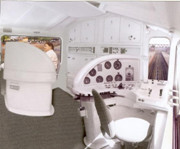Lighter products with higher strength
 In view of the crucial need for developing indigenous capability in composites technology, the Advanced Composites Programme attempted to enhance the utilization and application of composites as an important performance material in various sectors and to improve the laboratory-industry linkages towards development & commercialization of technologies.
In view of the crucial need for developing indigenous capability in composites technology, the Advanced Composites Programme attempted to enhance the utilization and application of composites as an important performance material in various sectors and to improve the laboratory-industry linkages towards development & commercialization of technologies.
 The Programme has worked closely with micro, small & medium enterprises (MSMEs), developing composite products & processes on-site, with support from centres of excellence, leading technology institutions and CSIR laboratories in terms of design, material selection, process optimization, equipment specifications & procurement, prototype development and product testing towards user acceptance. Attractive financial packages, technological risk sharing, market related interventions, strong programme management and knowledge-based project monitoring by experts helped the industry in reducing the product development cycle. These have been critical elements in nurturing technology towards prototype development and subsequent commercialization. The products developed with upgraded technology are successful in replacing some of the imported ones with better efficiency & enhanced life. The programme also facilitated skill development and enhancement for the industry personnel.
The Programme has worked closely with micro, small & medium enterprises (MSMEs), developing composite products & processes on-site, with support from centres of excellence, leading technology institutions and CSIR laboratories in terms of design, material selection, process optimization, equipment specifications & procurement, prototype development and product testing towards user acceptance. Attractive financial packages, technological risk sharing, market related interventions, strong programme management and knowledge-based project monitoring by experts helped the industry in reducing the product development cycle. These have been critical elements in nurturing technology towards prototype development and subsequent commercialization. The products developed with upgraded technology are successful in replacing some of the imported ones with better efficiency & enhanced life. The programme also facilitated skill development and enhancement for the industry personnel.
 The programme laid emphasis on using varieties of fibres and resin systems that are suitable for composite fabrication with different fibre patterns. Sophisticated design softwares were developed for proper alignment of fibre to overcome some of the limitations associated with the manufacturing processes. The programme paved way for good business opportunities in composite applications in the domestic market as well as avenues abroad. The industry partners for the programme achieved strong and profitable growth (10 to 30% of increased revenues per year generating 10 to 40% of return on capital employed).
The programme laid emphasis on using varieties of fibres and resin systems that are suitable for composite fabrication with different fibre patterns. Sophisticated design softwares were developed for proper alignment of fibre to overcome some of the limitations associated with the manufacturing processes. The programme paved way for good business opportunities in composite applications in the domestic market as well as avenues abroad. The industry partners for the programme achieved strong and profitable growth (10 to 30% of increased revenues per year generating 10 to 40% of return on capital employed).
The programme has made a visible impact on Indian Railways. 11 projects were launched of them include gear-cases for diesel & electric locomotives, axial-flow fans for diesel locomotives, sleepers for railway girder bridges, modular toilets for passenger coaches, FRP doors for passenger, composite interiors for railway coaches and composite interiors for diesel loco driver’s cabin.
The composite coach for Sky Bus was developed for Konkan Railway under the programme. This is the first indigenous technology for MRTS. The design of the coach was based on the principle of shear free monocouque structure.
 Composite houseboat developed for the backwaters of Kerala consumed about 19.20 tonnes of composites for its components such as the hull, deck and the superstructure- making the houseboat one of the largest composite products in the country.
Composite houseboat developed for the backwaters of Kerala consumed about 19.20 tonnes of composites for its components such as the hull, deck and the superstructure- making the houseboat one of the largest composite products in the country.
India’s first filament wound composite road tanker for horizontal mounting on truck was developed under the programme. Another milestone has been receiving of the prestigious certificate from American Petroleum Institute (API) for filament wound composite pipes and pipe-fittings. The industry partner in the project has been the first in South Asia and 17th in the world to have API certificate for glass reinforced epoxy pipes for critical applications (offshore & onshore) for oil & gas sector.
An endoskeleton type below-knee composite artificial limb, developed under the Advanced Composites Mission bagged the prestigious National R&D Award- 2001 from DSIR
.png)
